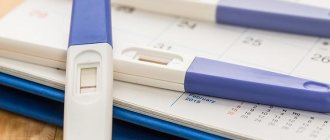Every adult girl must know that pregnancy and menstruation are mutually exclusive concepts. But sometimes doubt arises. The question of whether it is possible to take a pregnancy test during menstruation interests many women of reproductive age. It is impossible to prohibit a woman from conducting home testing at any phase of her cycle. In addition, such a study has no contraindications. However, the decisive factor in this process is compliance with the rules and the correct interpretation of the results obtained.
Following the theory, there is no point in taking a pregnancy test during menstruation. The menstrual cycle is divided into three phases:
- (active growth and maturation of follicles occurs);
- ovulatory (the dominant follicle that releases the egg is determined);
- (a corpus luteum forms in place of the follicular sac).
Further, in the absence of pregnancy, menstruation begins - the rejection of the endometrium, which was grown to attach the fertilized egg. If conception has occurred, then menstruation does not come on the prescribed day. The fertilized egg is attached to the wall of the reproductive organ and uses the endometrium as a nutrient medium, in much the same way as a plant feeds from the soil. The corpus luteum, functioning at the site of the burst follicle, secretes progesterone, which supports the process of development of new life.
It is logical to say that a pregnancy test during menstruation will show a negative result. After all, if bleeding began, then conception did not take place. Despite the rule, there are always exceptions. It happens that before the delay, a positive test was received and menstruation began as usual. Or menstrual bleeding has ended, and the strip strip shows a positive response. Of course, in any doubtful situation you should contact a gynecologist or do an ultrasound on your own initiative, but knowing in advance about the causes of this condition will also not be superfluous.
The feasibility and effectiveness of conducting a pregnancy test during menstruation
Absolutely all methods of testing for the presence or absence of pregnancy are based on the same principle: measuring the level of hCG in the urine. The hormone human chorionic gonadotropin is present in everyone’s blood – but in small doses.
And during pregnancy, its content begins to increase. First, the level of hCG seriously increases in the blood, and then the hormone enters the urine. And it becomes possible to determine pregnancy with its help.
A special substance with which the pharmacy test applicator is impregnated, in contact with urine, reacts with hCG if the amount of the hormone is sufficient for such an interaction. As a result, a second strip appears on the applicator, indicating pregnancy. This is how tests work.
And it doesn’t matter at all whether there is bleeding at the moment. Their presence does not affect the result. If fertilization has occurred, a pregnancy test during your period will most likely be positive.
True, these secretions will then be called completely differently. But the fact remains a fact, and the answer is clear: testing during menstruation is possible.
Alternative causes of increased hCG
At the initial stage, an interesting situation is diagnosed independently.
Pharmacy chains widely offer systems for determining human chorionic gonadotropin in urine. The hormone is a glycoprotein that is produced by part of the fertilized egg - the trophoblast. The active substance is necessary for the normal development of the placenta. Over time, the amount of hCG increases, reaching a maximum amount by week 10, and then continues to remain at a certain level. Detection of the hormone in the blood or urine highly likely indicates pregnancy.
In some pathological processes, the level of human chorionic gonadotropin may increase. In this case, the pregnancy test will be positive, but conception does not occur. This situation is typical for some types of malignant neoplasms and hydatidiform mole.
The level of glycoprotein will constantly increase. This is due to the constant production of the active substance by embryonic cancer cells. Therefore, a dynamic examination by a gynecologist throughout the entire period of gestation is a mandatory condition for monitoring a woman.
Features of the procedure
Each pharmacy test has instructions according to which you need to act. But if in ordinary situations the procedure can be carried out anytime and anywhere (at home, in a public toilet, at a party, in the morning, in the evening, at lunch...), then in the presence of menstruation the rules are somewhat supplemented.
Here are the main features of menstrual testing:
- The procedure is carried out exclusively in the morning - the first portion of urine is required for analysis, when the concentration of hCG in it is maximum.
- In the evening, a woman needs to limit her fluid intake. This will increase the concentration of the hormone in the first portion of urine.
- Before the procedure, you should thoroughly wash your genitals with running water, and then insert a tampon into the vagina. This will prevent blood from getting into the urine.
- Taking into account the previous points, we can conclude that it is best to do a pregnancy test during menstruation at home, in the most comfortable conditions.
The remaining rules are common to everyone. They relate to the depth of immersion of the applicator in the liquid, the time it remains there, the condition of the urine collection vessel, which must be sterile, etc. All this is stated in the instructions.
But there is one more important thing that a woman should definitely know: it is advisable to carry out testing starting from about the third day of menstruation.
If pregnancy has occurred, and this is not menstruation at all, then by this moment the level of hCG in the blood will already be sufficient to determine it. Before this period, the results may be unreliable.
Hormone determination options
At home, it is convenient to use special strips or jet tests. Such studies are screening, given the rapid, high-quality determination of hCG and ease of use. To obtain a reliable result, take a morning portion of urine, in which the concentration of the glycoprotein is the highest. Place the test strip into the container and hold for a few seconds.
For convenience, the pharmaceutical industry offers a jet method, when there is no need to collect urine in a container; it is enough to apply a few drops during the act of urination. The answer will become clear in a short time. If the hormone is present, a positive result is visible in the form of an additional stripe or a change in the color of the indicator, according to the instructions.
A more accurate method is to determine hCG in the blood. The doctor prescribes such an analysis during the patient’s first visit to the antenatal clinic. In this case, the quantitative content of the glycoprotein and its correspondence to the gestational age are determined.
Such a study is more informative, since with its help it is possible not only to confirm the onset of conception, but also to determine the correspondence of the hormone level to the gestational age. If there are deviations, the gynecologist will prescribe an additional examination to exclude gestational pathology.
Even if your period is on time, but you are sure that conception has occurred, you can take a pregnancy test. If the screening result is positive, you should immediately contact a gynecologist to conduct additional tests and clarify the presence of an embryo in the uterus.
Some women doubt whether a repeat test is necessary if the first data does not confirm the presence of hCG. In this case, doctors clearly confirm the feasibility of the study. The amount of the hormone in the first days after fertilization is small, so the result may be negative. It is necessary to determine the glycoprotein after a few days, when its level in the blood and urine increases.
One of the main conditions remains the proper conduct of research. To get the correct analysis, you must adhere to the following recommendations:
- Determine the level of hCG in the morning urine.
- Before collecting material, take a shower and perform intimate hygiene.
- If there is bleeding, it is advisable to install a tampon.
- Perform the procedure immediately after urination.
- Check the information on the test system in 3-5 minutes.
Probability of errors
Unfortunately, nothing is perfect in this world - and a pregnancy test is no exception. Even the most expensive and modern device cannot provide a 100% guarantee of the veracity of the results. The possibility of error should always be allowed for.
Among the main reasons for a false test result are the following::
- the rules of the procedure were not followed;
- the device is damaged;
- the test has expired;
- pregnancy has just begun, and hCG in the urine has not yet been identified.
There are a few other points to keep in mind. So, for example, if there is an ectopic pregnancy, the second line on the applicator may appear very faintly - be almost invisible, but still visible. In this situation, you need to repeat the procedure, or even better, visit a gynecologist.
It also happens that the test clearly shows the presence of pregnancy, which in fact is not the case. The cause may be a serious health problem. With some tumors that are hormonal in nature, the level of hCG increases as much as during pregnancy. That's why the test reaction is like this.
Causes of menstruation during pregnancy
When a pregnancy test comes back positive during their period, most women are stunned. After all, everyone knows that the onset of conception presupposes the absence of menstruation throughout the entire period. But the human body is a delicate thing, and various anomalous phenomena are not excluded.
There are two main explanations for “periods” during pregnancy:
- A miscarriage that has begun or has already occurred. It happens that a woman does not even suspect that she was pregnant and lost her child. The discharge that accompanies spontaneous abortion is very similar to menstruation. The only thing is that they are usually more abundant, and the process itself is more painful for the woman. The positive test result in this case is explained by the fact that the hCG level has risen, but has not yet had time to fall after the breakdown.
- “Colored” or “hidden” pregnancy. This is the name in medicine for a phenomenon for which scientists have not yet received an exact explanation. It involves periodic bleeding against the background of a completely normally developing fetus inside the uterus. Usually your period comes at the same time as usual. But the volume of discharge, as a rule, is not so large. However, many women do not notice this and think that they are not pregnant until the baby’s first movements.
In both cases, a woman who receives a positive test result during her period should definitely consult a doctor. After all, a miscarriage is very serious. In addition, even in the presence of bloody discharge, there is always a chance to save the child by taking timely measures. Well, it is advisable to “declassify” a “hidden” pregnancy early - this is understandable and without explanation.
So, to the question of whether a test during menstruation will show the presence of pregnancy, if any, the answer is yes. In most cases. At least, the blood will not affect the determination of the level of hCG in the urine. But other factors may play a role: failure to follow the instructions, a spoiled test, etc. If there are any doubts, it is better not to suffer from the unknown, but to visit your doctor and find out everything 100%.
Author: Alexander Indra, doctor, especially for Mama66.ru
Two stripes after menstruation
After menstruation, a test can be positive for two reasons:
- we are talking about bleeding that is not related to menstruation;
- A hormonal imbalance occurred, resulting in two ovulations.
If the study is carried out immediately after the end of bleeding, and the test shows two stripes, then the cause of this condition may be a hormonal imbalance. The test may mistake some other hormones for the hCG hormone if they are present in the urine in high concentrations.
In rare cases, a woman may experience two ovulations in one cycle. In this case, the egg will be released at different times. One follicle ovulates at the prescribed time, and the second only before menstruation. With unprotected sex, conception will occur, as a result of which the woman will receive a positive test a few days after the end of bleeding.
Many women mistake bleeding of a different origin for menstruation. For example, there is pregnancy, and bleeding is caused by erosion or injury to the cervix. Often this bleeding occurs after sexual intercourse. It turns out that conception has occurred, and the test will soon show a positive result, and the woman believes that she is now having her period.
The cause of short bleeding may be implantation of the embryo into the uterine cavity. If a woman tests at home just 3-5 days after menstruation, and the bleeding was short and not heavy, and the test shows 2 stripes, implantation has probably taken place. When the fertilized egg implants into the wall of the reproductive organ, minor damage to the blood vessels occurs. Discharge of blood for 1-3 days is considered normal, but many women mistake it for another menstruation. Patients tell the doctor that they had a positive test after their period.
The advisability of pregnancy testing for spotting
Young women are often completely ignorant of pregnancy issues when it comes to their health and play the role of expert when asking for advice on forums. But how to explain, for example, the case when “there are no signs of pregnancy, except for delay, and the test is positive”? Who to believe - tests, periods or your feelings? It’s difficult to answer unequivocally, but it’s worth understanding all the details.
Attention: Do not rush to regard any bloody marks on your underwear as menstruation! If a week and a half ago, on the days of ovulation, you had unprotected sex, your basal temperature does not drop, and there are some signs of pregnancy - buy a test and get checked. Most likely, it will show a positive answer.
After reading the warning, do not go to extremes. Should I panic and get tested every period? Of course not! In most cases, you can wait until your next period and calm down. But tell yourself honestly - are there any grounds for suspicion? Is this really an ultra-sensitive pregnancy test positive and your period started or did something go wrong?
Gynecological practice confirms that discharge is possible with the fetus inside the uterus, to which women react as confirmation of cyclicity. Women suspect pregnancy when there are prerequisites, sometimes even intuitively. And even if their period came on time, they “see” the birth of a new life in their body. They will not be deceived by a “daub” and a positive pregnancy test; they would rather believe a pharmacy test than a bloody “falsification”.
More compelling reasons to suspect an “interesting situation” are when basal temperature is measured with a rectal thermometer every morning. Perhaps it does not fall after the days of ovulation, it remains at the level of 37.1 - 37.3 ° C, and the test has already been carried out, it showed “pregnon” (pregnancy), a repeat one is needed for reliability. Then it doesn’t matter whether there are traces of blood from the vagina or not, what’s more important is not your period, but a positive pregnancy test.
It happens that pregnancy proceeds normally, the woman is sure that everything is fine, there was a positive pregnancy test during menstruation. No one paid attention to the discharge, but these days, like a bolt from the blue, menstruation or something similar comes again. In this situation, you urgently need to see a doctor, take a laboratory test for hCG and identify the cause of the discharge.
There are 3 options possible:
- This is not a period with a positive pregnancy test, but a false positive result.
- The fetus is there, but it is not well established in the uterus, spontaneous abortion is possible - this is not menstruation.
- The bloody mark has nothing to do with the fetus or menstruation; medical consultation is necessary; it is advisable to bring a positive test with you.
Advice: If testing has been carried out and there is a positive answer, it is decided to check again for fertilization in 2-3 days - continue self-examination. Perhaps this will dispel all doubts or strengthen confidence in the new position, even if your period has started.
Next, we’ll find out whether periods affect a pregnancy test.
Why is the test needed?
Many women do not understand that the simplest “two-striped friend of girls” is the greatest invention of our civilization, which all previous generations dreamed of. And although the pharmacy device does not eliminate the need for medical confirmation, the test helps answer many exciting questions. But confusion arises if the pregnancy test is positive and your period has arrived.
Important: The later the testing, the more truth in the answers, especially when you buy a system with sensitivity marks on the packaging. If an ultra-sensitive test recognizes the “pregnancy hormone” at a level of 10 mME/ml, but an ordinary “minke” does not always sense hCG at a concentration of 20 mME/ml.
One can hope for a reliable answer no earlier than during the days of delay, especially when the body is still signaling pregnancy in some way. Do you have a positive result on a small electronic display of a high-quality, expensive test? It is not a fact that this scanty discharge is menstruation, and a positive pregnancy test gave a reliable result.
Most likely, the fertilized egg is looking for a place, and this is just implantation bleeding. Many women will confirm that the pregnancy test is positive and menstruation is underway. The only way to make sure is to donate blood for hCG at the clinic. This is a common hormone to which both the test and laboratory analysis react.
Compounds similar to the hormone human chorionic gonadotropin are present in low concentrations in the blood of many women. Similar compounds are produced in some tumor processes, but in small doses, they can be recognized by an ultra-sensitive test. Testing can also show traces of hCG from a previous pregnancy during menstruation, if there were other signs, will the test show it even if it was not noticed by the woman? Yes!
Perhaps the fertilized egg did not settle in the uterus and came out with the next period. In this case, the level of hCG should rise, and if the pod is rejected, it should fall.
The test showed two lines, but menstruation began
If the test is positive, but your period has begun, then the first thing doctors will think about is the threat of interruption. Gynecological statistics show that every third expectant mother experiences this condition at different stages. The reasons for the threat can be very different:
- corpus luteum deficiency;
- formation of detachment and hematoma;
- abdominal trauma;
- disruptions in the functioning of the endocrine system;
- increased nervousness;
- hard physical labor;
- inaccurate gynecological examination;
- "aggressive" sexual intercourse.
In many cases, timely medical intervention and correctly chosen therapy will allow you to maintain the pregnancy so that the next menstruation begins only after childbirth.
Also, the cause of this condition can be a biochemical pregnancy that is interrupted before the delay. That is, fertilization of the egg took place, but it did not attach to the wall of the uterus.
Another option is an ectopic pregnancy. Attachment of the fertilized egg in an unintended place is manifested by the fact that a positive pregnancy test is accompanied by vaginal bleeding.
Testing during menstruation is practically no different from the usual procedure for determining pregnancy during a delay. All tests, regardless of their manufacturer and brand, both expensive and simple ones, operate on the same principle. A section of the test strip contains a special reagent. When interacting with a woman’s urine, this reagent recognizes the hormone hCG (human chorionic gonadotropin) and shows a positive result.
In the body of every woman, the hCG hormone is contained in very small quantities, therefore, if there was no conception, it will not show a positive result. Starting from the second week, the concentration of this hormone in the blood increases more than 5 times, which will immediately confirm a positive test for menstruation and its delay - 2 red stripes will appear on it.
Is it possible to take a pregnancy test during menstruation?
If tests are carried out at certain intervals, the hormonal level increases, which means that this is not menstruation, but a full-fledged pregnancy, and its deviations should be monitored by a gynecologist. So we come to the conclusion that a positive pregnancy test is possible and your period has arrived. But how can you check with a pharmacy test? Will menstrual blood affect the results?
Important: Doctors say that discharge during menstruation cannot change the concentration of the control substance to which test indicators react. After hygiene procedures, you can safely test without worrying about errors due to the presence of menstrual blood.
The main indicator for pregnancy registration is the presence of hCG in the blood, where it is in its “pristine” form. Of course, if you drink a lot of fluid in the evening before the examination, this will slightly change the overall concentration of blood and urine. But doctors are interested in the increase in concentration or its decrease, which is an indicator of an interrupted pregnancy.
The principle of operation of all tests is the same, the difference is in price, method of applying the reagent, shelf life and sensitivity. All contain a “litmus” that reacts with the embryo’s chorionic gonadotropin, which secretes the developing placental barrier. If there is one, the test, depending on the form of release, will definitely show “pregnon”, “+” or “2 stripes”.
Don't hesitate to take a pregnancy test during your period in the first trimester. Just be sure to check the expiration date, read the instructions and do not use the system after the initial use if the result was negative. Although today you can find reusable electronic tests that are used before the inscription “pregnon” (pregnancy) appears, problems arise with their proper storage.
The testing procedure is performed on the day of the delay in the morning, after washing the external genitalia; the first portion of urine is needed, it is the most concentrated. To be safe, you can insert a tampon into the vagina, which women usually use so as not to stain their underwear during menstruation. But it needs to be placed as deep as possible so as not to interfere with urination. Then clean urine without blood will fall into the container with urine or onto the tester.
Late period or premenstrual syndrome?
If there are no other signs of "interesting position", will the test show pregnancy during menstruation? In most cases, people run to the pharmacy for tests only when there is a delay. If not discharge, for most women this is the main sign of successful fertilization, especially when this replenishment has been awaited for a long time.
It is important to consider factors that affect the concentration of hCG during a delay:
- Women have different cyclical periods.
- There is early and late ovulation.
- The fertilized egg can quickly descend into the uterus to the site of implantation and “walk” through the fallopian tubes for a long time.
If your periods are irregular, there is no certainty that this is a delay. A woman who is preparing to become a mother is required to monitor herself for other signs confirming the presence of a fetus in the uterus, even if a positive pregnancy test is received during menstruation.
The best option is to conduct a series of tests with highly sensitive test systems that recognize the concentration of the hormone. If in doubt, there may be no pregnancy. Third-party signs often indicate premenstrual syndrome when there is a delay due to hormonal fluctuations; there is a separate article on this on the site.
Pregnancy test immediately after menstruation and the likelihood of error
There is nothing perfect in this world, and any test can give an error: 1. False positive answer. 2. False negative.
The possibility of error should be accepted, especially if the test is nearing the end of its shelf life. There are other reasons:
- oncology and diseases of the genitourinary system;
- violation of storage rules and violation of sterility during testing;
- interrupted conception at an early stage;
- traces of hCG from a previous pregnancy or concentration is insufficient for the level of sensitivity of the test.
If the pregnancy test is positive after your period, there may not be a pregnancy. This happens in medical practice; most likely, doctors will offer a comprehensive examination to find the cause.
The probability of “accuracy” of a home test will be higher over a longer period. Wait a few days and get tested again. You may have a positive pregnancy test after your period. Then it is better not to “play cat and mouse” with tests, but to take laboratory tests. Girls who want to hide their new position often resort to repeated testing.
You can take a pregnancy test immediately after your period to make sure. This is a desirable situation. Or you decided to wait until after the birth of your baby - all the same, you can’t do without a doctor’s office. The antenatal clinic will answer all your burning questions and help you carry and give birth to a full-fledged child.
Delayed menstruation is the most characteristic, universal and common sign of pregnancy in the early stages. In the overwhelming majority of all cases, women begin to suspect that conception has occurred precisely because of the absence of the next menstruation on time. But the opposite cases also often happen: when a woman who is almost sure of pregnancy suddenly begins to menstruate. Is it possible to check the real picture, and will a pregnancy test during menstruation show a true result?
When do tests lie?
They can show both false positive and false negative results. The reason for this may be:
- diseases of the genitourinary system;
- improper testing - failure to comply with hygiene or instructions;
- untimely execution.
A woman should understand that menstruation or any other bleeding does not pose a particular danger only in the first month of pregnancy. If this phenomenon does not stop by the end of the first trimester, this is a serious reason to sound the alarm.
Is it possible to take a pregnancy test during your period?
Let's start with the most important and exciting thing: you can take a test during your period. Moreover, menstrual bleeding does not affect its plausibility. As you know, a pregnancy test responds to the level of hCG (human chorionic gonadotropin hormone), which first rises in the blood and then begins to increase in the urine. In this regard, a blood test for hCG levels is considered the most informative in the early stages of pregnancy.
If you resort to a home test, then remember that the probability of a true result is higher, the longer the pregnancy, and besides, different tests have different sensitivity. Therefore, if the test shows a negative result, then it makes sense to verify its veracity by conducting another test a week later.
Please also note that a pregnancy test can be false positive and false negative: such “errors” are influenced by many different factors. And, by the way, menstruation can also affect the result if the test is carried out in violation of sterility rules. But the fact of the onset of menstruation does not change the test result.
So, for a pregnancy test to be true, it is necessary to carry it out after a missed period (and in our case, after it starts) in the morning, using the first portion of urine. Try not to drink a lot of liquid at night so that the concentration of hCG is quite high. And be sure, when doing a pregnancy test during menstruation, toilet the genitals and insert a tampon into the vagina to avoid blood getting into the urine vessel (which should also be sterile clean).
But it is best to wait until your menstrual bleeding ends to test, or repeat the pregnancy test after your period.
Other causes of bleeding during pregnancy
Bleeding during pregnancy is not a rare condition. 20% of the fair sex who are expecting the birth of a baby continue to have regular menstruation. This process is called fetal washing. Another definition is color pregnancy.
The phenomenon is characterized by the onset of menstruation at the usual time. The intensity of discharge and the number of days often remain within the same limits. In some cases, there may be scanty or, conversely, heavy periods, and their duration is reduced or increased. Continuous bleeding is extremely rare.
In most patients, such changes are noted during the first trimester, and then level out.
Women who experience a similar phenomenon doubt whether the test will show pregnancy during menstruation. At conception, all representatives of the fairer sex produce human chorionic gonadotropin. Therefore, within a certain period of time, tests will show a positive result.
Bleeding does not affect hormone levels if pregnancy is not accompanied by any pathology. The level of hCG in women with signs of fetal ablution is exactly the same as in a standard pregnancy.
Pregnancy or premenstrual syndrome?
Now let's try to figure out why you suspected pregnancy during your period?
Undoubtedly, in some cases a woman has more than compelling reasons to suspect pregnancy. But very often, worries arise completely unfounded. Premenstrual syndrome leads us astray. The chest becomes full, sore and becomes overly sensitive to irritation. The mood becomes quite changeable: we either cry over trifles, or laugh for no reason. Often there is a headache, drowsiness, fatigue, weakness... Changes in appetite and taste preferences make you even more inclined to think about pregnancy. But suddenly our periods begin - and we don’t know what to think. Of course, you want to find out the state of things as early as possible, but just don’t rush to conclusions. Early signs of pregnancy may turn out to be symptoms of premenstrual syndrome - many of them are exactly the same.
When is it recommended to take the test?
It is recommended to perform the procedure while having menstruation when a woman experiences the following atypical symptoms :
- Breast pain and enlargement.
- Increased skin sensitivity.
- Nausea, heartburn.
- Dizziness, fainting.
- Strong headache.
- Constant mood swings (temper, irritability, tearfulness).
- Fatigue, constant feeling of lack of sleep.
- Changing taste preferences.
These conditions are often a sign of pregnancy . Therefore, in a sexually active woman, the presence of such symptoms even during menstruation may mean conception has occurred. In such a case, it is recommended to do a test and, if the result is positive, contact a specialist.
Often, such symptoms are the result of self-hypnosis , when a woman planning a child begins to concentrate on her feelings and mistake the usual conditions preceding menstruation for signs of pregnancy. The symptoms of early pregnancy and menstrual syndrome are quite similar, so it’s easy to get confused.
If the test result taken during your period is negative, it is recommended to repeat the test after 5-7 days . It is permissible to do a test every 48 hours, since the hCG level increases approximately 2 times in a couple of days.
If, with a negative test and ongoing menstruation, pronounced symptoms listed above are observed, it is advisable to consult a doctor without waiting for the results of a repeat test.









